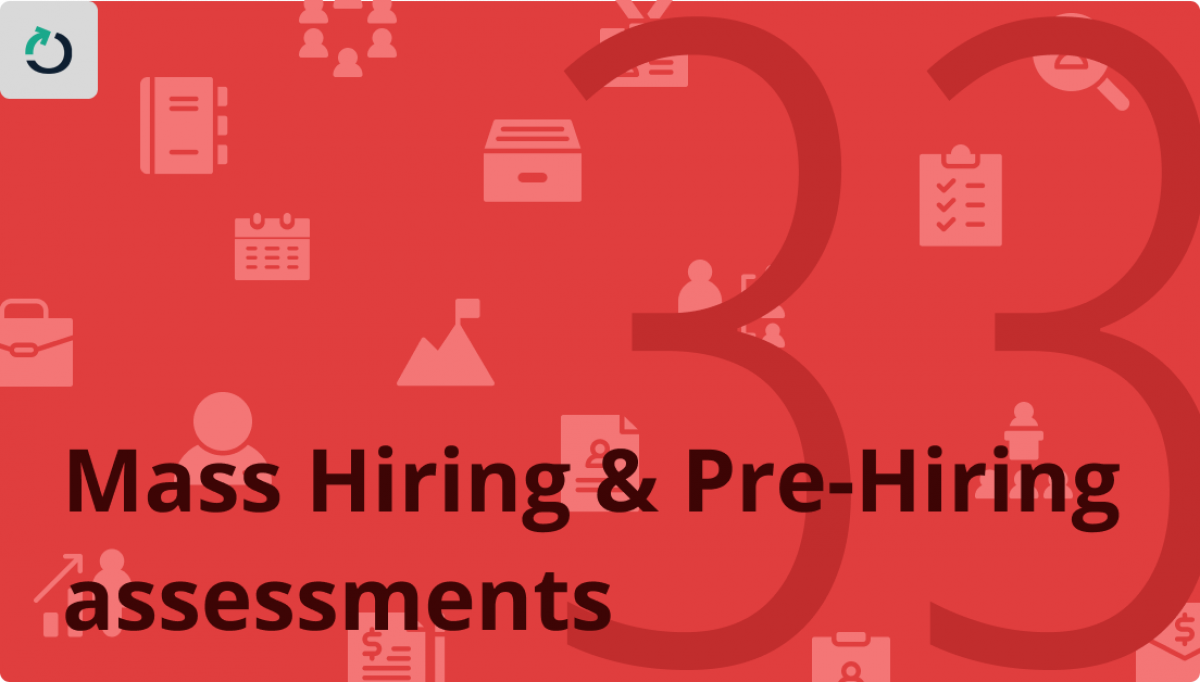Mass hiring is a unique challenge for many organizations. Companies must quickly sift through a large pool of candidates to find the best fit for their open positions. Pre-hiring assessments are increasingly being used to streamline the process and identify top performers before they are even hired. In this article, we will explore the importance of pre-hiring assessments for mass hiring and cite research to support our arguments.
One of the most significant advantages of pre-hiring assessments for mass hiring is their ability to identify top performers quickly. The recruitment process can become time-consuming and overwhelming when hiring large numbers of employees. Pre-hiring assessments can help recruiters evaluate a large pool of candidates in a short amount of time, making the process more efficient. According to a study published in the International Journal of Selection and Assessment, pre-hiring assessments are effective at predicting job performance, especially when it comes to cognitive ability tests (Bertua et al., 2005). Companies can make informed decisions about whom to hire without spending countless hours on interviews and other hiring tasks.
Moreover, pre-hiring assessments can help companies save time and money by reducing turnover. Turnover can be expensive for companies, as they must spend time and resources training new employees to replace those who have left. According to a study by SHL, companies that use pre-hiring assessments experience a 39% reduction in turnover rates compared to those that do not (SHL, 2012). This is likely because pre-hiring assessments help identify candidates who are a better fit for the job and the company culture, reducing the likelihood of early departures.
Pre-hiring assessments can also help reduce bias in the hiring process. When hiring a large number of employees, it can be challenging to ensure that all candidates are evaluated fairly. Studies have shown that unconscious biases can influence hiring decisions, excluding qualified candidates based on gender, ethnicity, or socioeconomic status (Huffman et al., 2010). Pre-hiring assessments can help reduce bias by providing objective criteria for evaluating candidates, such as skills or cognitive abilities.
Research has also shown that pre-hiring assessments can help improve the quality of hires. A study by OutMatch found that companies that use pre-hiring assessments had 20% more high-performing employees than those that did not (OutMatch, 2019). This is likely because pre-hiring assessments can identify candidates with the necessary skills and traits to excel in their roles, leading to better job performance and outcomes.
In addition to improving the quality of hires, pre-hiring assessments can also help companies build formidable teams. When hiring many employees, it is essential to ensure that they work well together and contribute to a positive team dynamic. By assessing candidates' skills and personality traits, recruiters can identify individuals likely to work well with others, communicate effectively, and contribute to a positive team dynamic. This can lead to higher productivity, increased employee engagement, and better job satisfaction.
Moreover, pre-hiring assessments can help identify candidates who fit the company culture well. Ensuring that they align with the company's culture and values is essential when hiring many employees. Studies have shown that cultural fit is critical to employee engagement and job satisfaction (Kristof-Brown et al., 2005). By evaluating candidates' personality traits and values, recruiters can determine if they align with the company culture and values. This can lead to more robust employee engagement, lower turnover rates, and a better work environment.
It is worth noting that pre-hiring assessments are not without their limitations. Critics argue they can be biased, inaccurate, or even discriminatory if implemented incorrectly. Additionally, some candidates may feel that pre-hiring assessments are unfair or must accurately reflect their skills and abilities. It is crucial to ensure that pre-hiring assessments are designed and implemented with care to mitigate these concerns. Recruiters should use validated, reliable, and relevant assessments for job requirements.
In conclusion, pre-hiring assessment tools like Merreo are crucial for mass hiring. They can help companies quickly identify top performers, reduce turnover, mitigate bias, improve the quality of hires, build stronger teams, and ensure that candidates are a good fit for the company culture. By using pre-hiring assessments, companies can save time and resources while making informed hiring decisions that benefit both the organization and the new hires.
References:
Bertua, C., Anderson, N., & Salgado, J. F. (2005). The predictive validity of cognitive ability tests: A UK meta-analysis. International Journal of Selection and Assessment, 13(3), 218-225.
Huffman, A. H., Culbertson, S. S., Wayment, H. A., Irving, L. M., & Isgro, K. L. (2010). Work–family conflict, gender, and diversity: Lessons learned from a decade of research. Journal of Vocational Behavior, 77(3), 487–503.
Kristof-Brown, A. L., Zimmerman, R. D., & Johnson, E. C. (2005). Consequences of individual fit at work: A meta-analysis of person-job, person-organization, person-group, and person-supervisor fit. Personnel Psychology, 58(2), 281–342.
OutMatch. (2019). OutMatch research report: The impact of candidate assessments on hiring. Retrieved from https://outmatch.com/research-report-the-impact-of-candidate-assessments-on-hiring/
SHL. (2012). The business case for pre-hire assessments. Retrieved from https://www.shl.com/content/uploads/2016/08/The-Business-Case-for-Pre-Hire-Assessments.pdf





